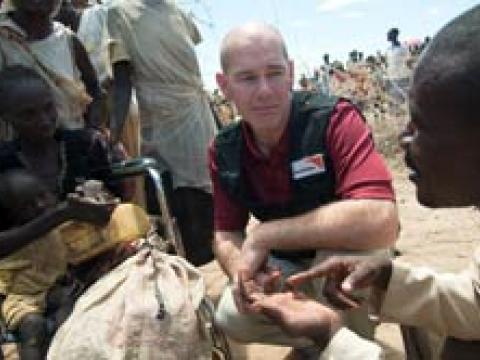On the dilemma of the Horn

The drought and food emergency in the Horn of Africa is devastating for those who live in the region, and harrowing for the world watching from a distance.
This is a truly extreme event. Local people confirm scientists’ assessment, calling it the worst drought in their memory. Yet the impact can seem all too familiar. Skeletal livestock, failed crops and achingly hungry children are once again featured on our TV screens and in the newspapers. The images make it logical to question whether aid really does any good. Some suggest that the muted public response is because potential donors are suffering from ‘compassion fatigue’.
I don’t think so. People don’t tire of being compassionate. It’s at the core of who we are.
There is frustration that the problem keeps returning with no obvious ‘fix’ on the horizon. A desire to hold humanitarian organisations and governments accountable is understandable. However, this is a yearning to maximise impact, not a lack of compassion.
It is hard to feel compassionate about statistics. What do you do when someone tells you 12 million people are food insecure or that two million children’s lives are at risk? Statistics are an abstraction, and no one is compassionate about an abstraction, but all of us can show compassion to another human being.
Many have said to me that it is such a big problem, they don’t know where to start trying to help. My feeling is that we should never let the fact we can’t help everyone stop us from at least making a difference for someone.
Among the earliest trips I made after becoming President of World Vision was to the arid north of Kenya. I took part in a food distribution to Turkana mothers and children who had become unable to support themselves through conflict, bereavement or the other injustices of life lived in conditions on the edge of survivability.
It was clear that by organising distributions of food World Vision was having a profound effect – saving the lives of seriously malnourished children, but also helping to stabilise very vulnerable families. Children told me they were able to go back to school for the first time in a year. Women were able to look for work to supplement their own resources.
World Vision is responding once again. We are stabilising communities with food and water for more than 600,000 people in Kenya. We are drilling boreholes in Ethiopia and setting up clinics, cash-for-work projects and supplies of extra food to critically underfed children in parts of Somalia.
Where we cannot access communities in Somalia, we are providing tents in Dadaab refugee camp over the border. Overall we are attempting to meet the needs of 2.5 million people with things that include non-food items, water, food and medical support by our partners. We will be taking special care of the most-vulnerable children in Child Friendly Spaces, a vital contribution to any relief emergency. And we are working with communities, governments and international partners to make sure help is properly distributed and there is no duplication.
Part of World Vision’s job is to tell the stories of individuals in these crises in a way that helps those of us who cannot envisage a million hungry people to understand hunger’s impact on real people’s lives. For example, our staff’s explanation of the way we provide water tells you about Farah Bilow, but also about the millions of people like her whose lives are dependent on the rain – or on the life-saving supply of water from a truck.
The power of a story is that it helps us remember our common humanity. Every mother wants a better future for her children, every child needs security and love, every father wants to be empowered to provide food for his family.
We cannot look at the people in the Horn of Africa – people like us – and lose compassion for them just because their environment has turned against them once again.
In the first famine of the 21st century, and one of the greatest tragedies in recent memory, let’s remember we are neighbours to the child with no food and the mother in a temporary tent on the Kenyan border.
Allow me to urge you, our partners and supporters – as I call on all our staff – to support those working in the Horn of Africa by telling the stories of need and success and answering those who say that this crisis is too big to respond to, or too far away to care about.
Find out more: A World Vision survey finds that half of the children living in the affected regions of Kenya have not seen food for a day.